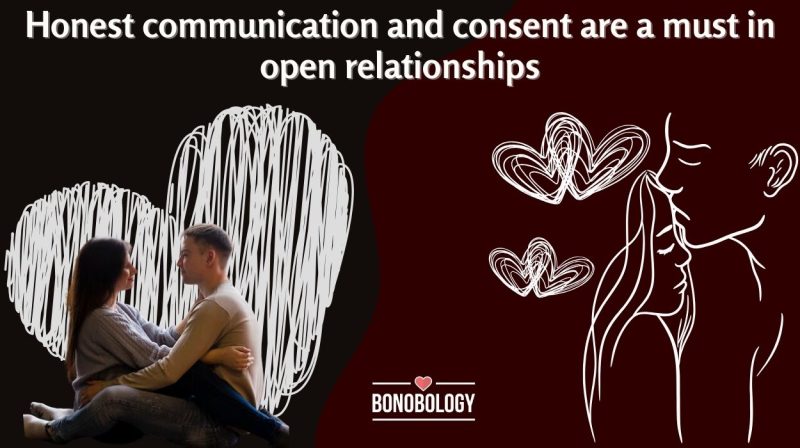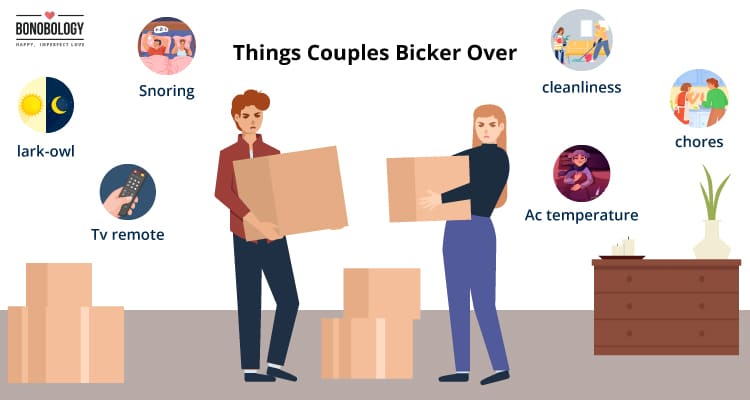I’ve been living with my partner for a couple of years. So a friend sat me down recently, and said earnestly and completely out of the blue, “Okay, tell me all the red flags for moving in with a partner. When is it appropriate to move in together? Be honest.” This is how I got to know the good news about her and her boyfriend. But it was clear that, for now, she was more interested in knowing about the possible red flags before moving in together with the one she loved.
I get why she was scared. After all, moving in with a partner, in many ways, is a litmus test for the strength and compatibility of your long-term relationship. It’s a significant milestone, signaling a deeper commitment and shared life journey. Before taking the leap and moving in with your partner, it’s essential to make sure you’re both on the same page. Today, we’ll explore the 13 red flags you shouldn’t ignore while taking this exciting step toward a new living situation. Whether you’re considering moving into an apartment or investing in something bigger, like a house and land package in Melbourne, it’s crucial to recognize the warning signs that could indicate trouble ahead.
What Are The Red Flags For Moving In With A Partner? 13 Signs You Cannot Ignore
Table of Contents
Moving in with a partner can be both exhilarating and daunting. The juncture signifies the merging of two lives, shared responsibilities, and a long-term commitment. While the idea of sharing your living space with a romantic partner can be exciting, it’s crucial to be aware of potential challenges and pitfalls that might emerge from this decision. To ensure this journey is a smooth one, it’s imperative to recognize and address potential red flags before moving in together. After all, you wouldn’t want to discover red flags AFTER moving in together and having co-signed a lease.
Consider having a trial run for a month or so to see if it’s a good idea. A study confirms this: “Among cohabiters, about a quarter (23%) say wanting to test their relationship was a major reason why they decided to move in with their partner.” In this section, we will delve into 13 unmistakable signs you’re not ready to move in together. Because once the honeymoon phase is over, reality can hit hard.
Related Reading: How To Watch Out For The Relationship Red Flags — Expert Tells You
1. You have mismatched goals and expectations
One of the most critical red flags before moving in together is the presence of mismatched goals and expectations. In the context of a healthy relationship, this issue extends far beyond mere differences in career objectives or housing preferences. It delves into the very core of your long-term compatibility.
Even with open communication in your new living situation, it can be hard to accurately gauge other’s expectations. Here are some red flags you need to be aware of to successfully navigate this phase:
- Career aspirations, if mismatched, can place a considerable strain on a relationship
- Differing expectations about family planning
- A mismatch in lifestyle choices which encompasses spending habits and leisure activities, to dietary choices and health and fitness priorities
- Housing and location preferences can be significant sources of contention too
The key to addressing this red flag is open and honest communication. Before moving in together, ensure that you’ve discussed your individual goals and expectations and made sure you’re on the same page. It’s essential to reach a mutual understanding or compromise on these matters to avoid potential conflicts in the future. Remember that a strong and lasting relationship is built on shared values and a vision for the future that aligns with both partners’ aspirations.
Related Reading: The 8 Commandants Of Open Communication In A Relationship
2. Poor communication doesn’t bode well for a partnership
Poor communication often leads to emotional detachment between partners. When you’re unable to express your thoughts, feelings, or concerns openly and honestly, it can create a divide between you two. Unspoken worries or unexpressed affections can breed resentment, frustration, and a sense of being misunderstood. In a shared living space, emotional distance can become more pronounced, as there’s no escape from the underlying tension.
Here are some suggestions — More like a moving-in-together checklist:
- Why are we moving in together?
- What are our long-term goals as a couple?
- How will we approach financial planning and credit scores?
- What are our expectations for household chores and responsibilities?
- What are our personal boundaries and space needs?
- How do we approach conflict resolution?
This is not an exhaustive list by any means but these are some questions to ask before moving in together to align expectations and help you both make informed decisions about cohabitation. Remember that the key to a successful shared living arrangement is ongoing communication, mutual respect, and flexibility as you adapt to your new life together.

3. Financial incompatibility is a red flag between partners even if they don’t live together
Financial incompatibility is one of the biggest red flags before moving in together. It’s a complex issue that extends far beyond just sharing expenses; it touches on your values, habits, and attitudes toward money. A study shows that 38% of participants moved in with their partner because it made sense for them financially. Imagine if they don’t talk about financial boundaries and limits before moving in. Here are two possible scenarios in that case:
- Varied spending habits: This can be a significant source of tension. If one partner is a spender while the other is good at saving money, it can lead to continuous disagreements about how money is allocated and spent. These differences can create a cycle of frustration and financial instability
- Substantial income disparities: This can create an unbalanced power dynamic within the relationship. The partner with the higher income may unknowingly hold more influence over financial decisions, which can lead to feelings of inequality and resentment. The partner with the lower income will also have to think hard about an exit strategy
Financial incompatibility doesn’t have to be a deal-breaker, but it does require respect, compromise, and a willingness to work together to find common ground. It is one of the most important things to discuss before moving in together because financial stability becomes more important when you’re in a relationship.
Related Reading: 5 Ways To Overcome Financial Stress In Relationships
4. Things to discuss before moving in together: Unresolved conflicts
Unresolved conflicts within a tumultuous relationship are like hidden landmines, waiting to detonate at any moment. When considering the prospect of moving in with your partner, any lingering dispute is a red flag that should never be ignored.
Repressed issues often breed resentment. Addressing them before moving in together is essential. Seek to understand each other’s perspectives, compromise where necessary, and work together to find constructive solutions. If you’re unable to do any of this, it’s one of the clearest signs you’re not ready to move in together.
5. Lack of personal space is a no-no
The need for personal space is a fundamental aspect of our individuality and well-being. When the prospect of moving in together with your partner is on the horizon, the absence of personal space can be a glaring red flag that should not be underestimated.
For instance, one partner’s love bombing is a sign that the personal space of the other will be affected severely. That’s one of the red flags after moving in together. Dealing with each other’s friends visiting is also a discussion that needs to happen. Let’s explore the nuances and implications of this issue:
Related Reading: How To Differentiate Between Love Bombing And Genuine Care
- Emotional strain: When you feel that your partner is always present or hovering, it can lead to a sense of suffocation
- Independence and autonomy: A lack of your own space can make you feel as though your sense of self is diminishing
- Impact on communication: If you don’t have time to reflect, gather your thoughts, or enjoy quiet moments alone, it can hinder your ability to engage in meaningful, constructive conversations with your partner
- Escalation of conflict: The inability to retreat to your personal space when conflicts arise can lead to more heated and emotional disagreements
- Impact on intimacy: An absence of alone time can make you feel like you’re constantly in each other’s company, potentially leading to a loss of anticipation and desire for closeness
Addressing the lack of personal space is crucial before moving in together. It’s essential to communicate openly with your partner about such needs and boundaries. Leaving this unaddressed could be one of the signs you’re not ready to move in together.

6. If you move in with trust issues, you’ll move out with a heartbreak
Trust issues often lead to emotional distance. If you or your partner doubts the other’s fidelity or intentions, it can create a barrier, making it difficult to connect on a deep, intimate level. Moving in together while feeling emotionally distant can be challenging and may create an isolating environment for you both to live in.
Trust issues can manifest as feelings of insecurity and jealousy. These emotions can become overwhelming and create ongoing tension within your relationship. A partner who feels continually scrutinized or distrusted may become defensive, leading to further strain.
This is why addressing trust issues is a vital step before moving in together. Open, honest, and empathetic communication is key to a healthy relationship. Rebuilding trust may take time, though. And it might require the assistance of a professional, such as a therapist or counselor, to navigate the intricacies of the issues.

7. What are the red flags for moving in with a partner? Different levels of cleanliness
According to a Reddit user, “Living together shows very quickly if the person you are sharing space with is responsible, if they think of others, if they’re lazy, if they are willfully ignorant of the work it takes to maintain space and the basics of life. How do they care for themselves and others? Do they cook? Clean? Do laundry? Scrub toilets? Do they pick up after themselves? Wash dishes? Do they order food daily? Do they have a plan or do they just drift?”
So true! When considering moving in together, one often overlooked yet significant red flag can be differing levels of cleanliness between you and your partner. This seemingly mundane issue can have profound implications for your daily life and relationship. For instance, your partner’s eating habits on a date could be vastly different from what they are at home. This is a great example of discovering red flags after moving in together. Here’s a closer look at the consequences of this red flag:
- Compromised comfort: If cleanliness standards clash, it can lead to a feeling of discomfort and unease in your own living space, which is detrimental to your overall well-being
- Potential health risks: If hygiene practices are not aligned, it can lead to an unhealthy living environment and potentially affect your well-being
- Impact on time and energy: Differences in cleanliness standards can also impact the distribution of time and energy spent on housekeeping tasks
To address different levels of cleanliness, it’s essential to have open conversations about your expectations, habits, and needs regarding household maintenance. Ensure you’re on the same page and establish compromises that work for both partners.
Related Reading: Sharing Household Chores And Responsibilities Equally In Marriage
8. Disagreements over handling chores and responsibilities
The same Reddit user from above has more to say on the topic: “I would recommend getting a roommate for the year and seeing how he lives and if you’re really compatible. When you live together, you need to set expectations and responsibilities from day one. An imbalance of chores/responsibilities will get old fast. The one that benefits from ignoring the workload will be very reluctant to change.”
Dealing with household chores and responsibilities is often underestimated but regular friction while cohabitating with a partner. The division of household tasks can significantly impact the harmony of your living situation and your relationship. An uneven distribution of chores, especially based on gender roles, can lead to feelings of inequality and resentment. Miscommunication regarding chores can lead to disagreements. The presence of a structured system for managing household tasks can bypass a chaotic and stressful living environment, making it easier to relax and enjoy your shared space.

9. Question to ask before moving in together: How do you handle unhealthy jealousy?
Jealousy is a complex emotion that can either be a normal, fleeting reaction or develop into an unhealthy, persistent force within a relationship. When considering moving in together, unhealthy jealousy is a red flag that demands your attention. Here are some ways unhealthy jealousy can cause long-lasting relationship problems:
- Eroding trust: Unhealthy jealousy erodes trust, which is fundamental in any relationship
- Controlling behavior: One partner may attempt to limit the other’s interactions, monitor their actions, or demand constant reassurance, which can be stifling
- Emotional strain: Living under the shadow of jealousy can be emotionally draining
- Isolation: Unhealthy jealousy can lead to isolation from friends and family, as one partner may attempt to limit the other’s social interactions, or the affected partner feels too embarrassed to admit to their loved ones that their relationship doesn’t feel safe to them anymore
- Escalation of conflict: Jealousy often escalates conflicts and disagreements that could have been resolved more peacefully otherwise
Try out some trust-building exercises to help the jealous partner build confidence and self-esteem. If necessary, seek the guidance of a therapist or counselor to work through jealousy-related issues and foster a healthy, trusting, and loving cohabitation experience.
Related Reading: 11 Signs You Are Dealing With An Unhealthily Jealous Partner
10. If there’s a lack of individual growth already, don’t move in with your partner
The absence of opportunities for individual growth within a relationship is one of the most important red flags before moving in together. While a partnership should be supportive and nurturing, it should also allow for personal development. When a relationship doesn’t allow room for individual growth:
- It leads to stagnation
- It can damage self-esteem
- It can foster emotional or financial dependence on the other partner, creating a power imbalance
Identify the areas where you both feel limited in your personal development and work together to create an environment that encourages growth and self-expression. Encourage and support each other’s individual pursuits, whether they be career goals, hobbies, or personal interests. This should be one of the things to discuss before moving in together.
11. Resisting conflict resolution is one of the most glaring signs you’re not ready to move in together
When one or both partners resist conflict resolution in a relationship, it can lead to unresolved issues and ongoing tensions. This red flag, especially when contemplating moving in together, deserves close attention. Issues that remain unaddressed can fester and grow. Living together under such circumstances can sometimes become the only reason for a stressful and unpleasant home environment.
Both partners must commit to fostering effective conflict resolution strategies. This may involve developing better active listening skills, practicing empathy, and seeking professional guidance if necessary.
12. Rushing Into cohabitation is never the answer
How soon is too soon to move in together? Are you sure you’re at the right life stage for a decision like this? If you’re rushing into it after the third date or if it’s still the early stages of a new relationship, it’s definitely a bad idea. But realistically, it can be hard to tell whether or not it’s too soon. Hasty decision-making can lead to unexpected challenges and regrets, such as:
- Lack of preparedness: Rushing into cohabitation without adequate planning and discussion can lead to unanticipated issues and conflicts
- Unrealistic expectations: Moving in together with haste often involves romanticized ideals, which can lead to unrealistic expectations and ultimately, disappointment
- Lack of communication: Rushing into cohabitation can bypass important conversations about shared responsibilities, finances, conflict resolution styles, and individual boundaries, which can result in misunderstandings
- Increased stress: The process of moving and merging lives can be stressful in itself. Rushing into this process can amplify the stress, making it even more overwhelming
- Lack of a solid foundation: A strong relationship should be built on a solid foundation of trust, understanding, and mutual respect. Rushing into cohabitation can circumvent the process of establishing this foundation
Rushing to move in together can happen as a result of love bombing, so be wary of that. If you’re not sure, take a step back and look at the bigger picture. If you’ve started dating recently, it is definitely not a good idea. Take advice from trusted family members, friends, or a therapist.
Related Reading: 8 Signs You Are Rushing Into A Relationship And 5 Reasons You Shouldn’t
13. Lack of individual supportive networks is bound to backfire in a live-in relationship
Before moving in together with your partner, it’s essential to consider the availability of supportive networks. These can include friends and family who provide emotional, practical, and social support. The absence of such networks is a red flag that should not be underestimated. These individuals/groups also play a big role in your exit strategy, should you need one.
A lack of safe spaces can lead to emotional isolation. Moving in together often brings changes and challenges. When you lack external emotional support, it can make the process more emotionally taxing, causing feelings of loneliness and vulnerability. Here’s what you should do instead:
- Encourage each other to nurture existing friendships
- Build new connections
- Engage in social activities and seek out opportunities to create supportive relationships outside of the partnership
By strengthening your individual networks, you not only enhance your well-being but also foster a healthier, more resilient relationship.
When Is It Appropriate To Move In Together?
Determining the right time to move in with your partner should be marked by thoughtful consideration. Assess various factors such as the stability and depth of your relationship, your individual and shared goals, and your emotional preparedness.
So, when is it appropriate to move in together? The appropriate time to move in together differs for each couple, but it often aligns when both partners feel secure in their commitment, have communicated openly about expectations, and have addressed potential challenges. As a start, you can take this “should we move in together” quiz to find out where you stand.

As this Reddit user says, “My BF moved in with me when we had only been dating for 2 months, and today we’ve lived together for 7 years and happily married. What is too early for some might not be for others. If you’re meant to be, it doesn’t matter when you move in together. That being said, if you don’t feel ready for the next step, don’t do it just yet. Follow your gut.”
This study has found that your reason for moving in together also plays a role. It says, “Spending more time together and convenience were the most strongly endorsed reasons (to be in a live-in relationship).” Gender differences make an appearance too, and the study says that men were more likely to move in with their partner to test their relationship. While women were more likely than their partners to cohabitate out of convenience.
The readiness to live together often stems from mutual respect, shared values, and a sense of partnership that sets a solid foundation for a successful relationship. If you and your partner feel comfortable with the idea of living together after talking through these 13 points, it is a good sign for your future together.
Key Pointers
- This article highlights several red flags before moving in together, including financial incompatibility, trust issues, emotional connection, and a lack of personal space
- It emphasizes the importance of green flags like open communication and conflict resolution skills for a successful living arrangement
- We explore the significance of fostering individual growth, building supportive networks, and moving in together at the right time to ensure a fulfilling cohabitation experience
- Reflect on these red flags, engage in honest discussions, and establish a strong foundation for a harmonious shared life
In conclusion, the decision to move in together with your partner is a significant milestone in any relationship. Have a trial run if you can. When should you move in together? When you spend time with your partner to address these potential red flags, fostering open communication and nurturing personal growth. If you do this, it is a great sign that you can embark on this journey with confidence, ensuring a romantic and fulfilling cohabitation experience.
Moving In With Your Boyfriend? Here Are 10 Tips That Will Help
Your contribution does not constitute a charitable donation. It will allow Bonobology to continue bringing you new and up-to-date information in our pursuit of helping anyone in the world to learn how to do anything.





















Featured
My Wife Wants Open Marriage: 17 Tips To Navigate
Open Relationship Dating: What It Is & Why It Works
Polyamory Vs Open Relationship – 8 Key Differences (And Some Similarities)
Polyamorous Vs Polygamy – Meaning, Differences, And Tips
How To Make A Polyamorous Marriage Work? 6 Expert Tips
Are You Moving In Together? Checklist From An Expert
21 Expert Tips For Couples Moving In Together
Non-Monogamous Relationship: Meaning, Types, Benefits
Decorating Tips For Couples Moving In Together
How Soon Is Too Soon To Move In Together?
Cohabitation – Everything You Need To Know About It
Does A Friends With Benefits Relationship Actually Work?
Tips To Ease Moving In With Your Boyfriend
10 Open Relationship Rules That Have To Be Followed To Make It Work
Does Living Together Before Marriage Mean You Are Ready For The Wedding?
Marriage VS Live-In Relationship: Everything You Wanted To Know
What Are The Disadvantages Of Live-In Relationships?
5 Things To Consider Before Beginning A Polyamorous Relationship
7 Creative Ways To Ask Your Girlfriend To Move In With You
My friend invited me to his house and I fell in love with his wife